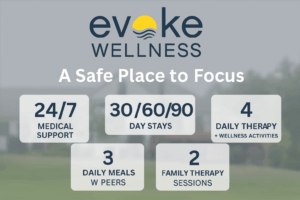Those first weeks of sobriety can feel like walking through a quiet town you used to know—familiar, but strangely empty. You might be surrounded by people yet still feel a deep ache for connection. Your routines have changed, but your emotions are still catching up. It’s a vulnerable place to be.
If you’ve been wondering whether a residential treatment program might help, you’re not alone. Many people in early recovery reach this point—the moment when the thought of staying sober and staying home feels overwhelming.
Here, we answer seven of the most common questions people have when considering residential treatment for the first time, so you can decide if it’s the right next step for you.
1. What Is a Residential Treatment Program?
A residential treatment program is a live-in recovery setting where you receive 24/7 care and structured support for addiction. It’s different from outpatient care because you stay at the facility full-time, immersing yourself in an environment designed for healing.
Think of it as a safe bubble away from the chaos, temptations, and triggers of your everyday life. In this space, everything—from your schedule to your surroundings—is aimed at supporting your recovery.
At Evoke Wellness at Cohasset in Cohasset, MA, a residential stay includes medical support, daily therapy, skill-building workshops, wellness activities, and time to rest without worrying about life’s constant demands.
2. How Long Will I Stay?
The length of stay can vary depending on your needs, progress, and what your treatment team recommends. Common timeframes are 30, 60, or 90 days.
While the number of days is important for planning, it’s not the most critical part of the equation. What matters is giving yourself enough time to stabilize physically, start healing emotionally, and practice the tools you’ll need after you leave.
Some people begin with a shorter stay and extend if they find they need more time. Others transition from residential into outpatient programs for continued care while adjusting back to home life.
3. What Will My Days Look Like?
In early recovery, structure is one of your best allies. Most residential programs follow a daily routine that balances therapy, skill-building, and personal time.
A sample day might look like this:
- Morning: Group therapy session followed by a skills or relapse prevention class
- Midday: Individual counseling or a check-in with your medical provider
- Afternoon: Recreational or wellness activities such as art therapy, yoga, or nature walks
- Evening: Peer support groups, journaling, or guided reflection
This steady rhythm replaces the unpredictability of addiction with a sense of safety. Over time, the routine becomes a comforting anchor—something many clients carry into their lives after treatment.
4. Can I Have Visitors or Stay in Touch With Family?
Most residential treatment programs offer ways to connect with loved ones, but the specifics depend on the facility’s policies. Many have visiting hours or family days, and scheduled phone or video call times.
At Evoke Wellness at Cohasset, we believe family involvement can be a vital part of recovery when handled with care. That’s why we offer family therapy sessions to help loved ones understand your recovery journey, learn healthy boundaries, and rebuild trust.
These moments of connection can help reduce the loneliness that often comes in early sobriety—reminding you that you have people rooting for you.
5. What Should I Pack?
You’ll receive a packing list before arrival, but most residential programs recommend bringing:
- Comfortable, weather-appropriate clothing
- Personal hygiene products (non-alcohol based)
- Any prescribed medications in original containers
- Approved reading materials or journals
- A small number of personal comfort items, such as photos or a favorite sweater
The goal is to bring what you need without cluttering your space. Essentials are provided, so you can focus on healing rather than logistics.
6. Will I Be Alone in This?
One of the biggest fears people have about entering treatment is the idea of being alone—physically or emotionally. In truth, a residential program surrounds you with peers who understand exactly what you’re going through.
You’ll share meals, group therapy, and downtime with others who are also rebuilding their lives. This shared experience often leads to deep, authentic connections—the kind you may not have felt in years.
Over time, these bonds can help replace the isolation of early recovery with a sense of belonging. Many people leave residential treatment with friendships that continue to support them long after discharge.
7. How Do I Know If Residential Treatment Is Right for Me?
Residential treatment can be a strong choice if:
- You’ve struggled to stay sober in your current environment
- You feel unsafe or unsupported at home
- You need time away from stressors to focus fully on recovery
- You’re looking for structure and 24/7 support in early sobriety
You don’t have to “hit rock bottom” to benefit from a residential stay. You only need the willingness to explore what a healthier life could look like.
Extra FAQs People Often Ask Before Coming to Residential Treatment
8. Will I lose my job if I take time off for treatment?
In many cases, you may be eligible for medical leave under the Family and Medical Leave Act (FMLA). This protects your job while you focus on recovery. Our admissions team can help you navigate these options confidentially.
9. What if I have health conditions besides addiction?
Many residential programs, including Evoke Wellness at Cohasset, offer integrated care for co-occurring medical or mental health issues. This means your treatment plan addresses your whole health, not just your substance use.
10. Can I smoke or vape during my stay?
Policies vary by facility. Some programs have designated smoking areas, while others are fully tobacco-free. You’ll be informed before admission so you can prepare.
11. What happens when I leave?
A good residential program includes discharge planning. You’ll leave with a clear aftercare plan, which might include outpatient therapy, peer support groups, or sober living arrangements to help you maintain progress.
12. Is it normal to feel nervous about going?
Absolutely. Nervousness is a sign you’re stepping into something new. Almost everyone feels it before starting residential care—but that feeling often turns into relief within the first few days.
Final Thought
Choosing residential treatment is not a sign of weakness—it’s a sign of commitment to your future. In early recovery, when loneliness and uncertainty feel overwhelming, a structured, supportive environment can help you reconnect with yourself and others.
You don’t have to go through this alone. There is a place where you can feel safe, understood, and guided toward lasting change.
Call 866-931-6429 or visit our Residential treatment program services in Cohasset, MA to learn more and take your next step.





